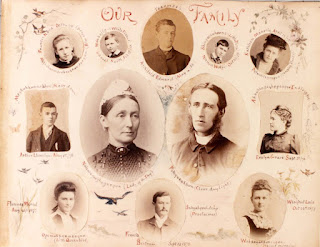What would you say if I told you that the lifestyle choices you're making today affect not only yourself, but possibly the next four generations of your descendants?
Think about that for a minute. Many people start their health-related thinking with the point of view that they're only hurting themselves, so they'd much rather "just enjoy life" than take care of themselves properly.
But, there may be more to it than that. Check out the video below from The Bulletproof Executive podcast, where host Dave Asprey is talking to Doctor Terry Wahls (author of the recent book The Wahls Protocol: How I Beat Progressive MS Using Paleo Principles and Functional Medicine
At about the 35-minute mark, the subject turns to epigenetics, which is the study of how various genes are expressed. For example, you'll hear people talk about how they have a particular disease gene, and they're just waiting for it to manifest as the actual disease. Epigenetics is showing us that the "waiting" is less about inevitability or time, and more about some factor in our environment that is making that gene's "power" come to life.
Those environmental factors can include just about anything that is acting on the human body: food choices, exercise, stress levels, external toxins, and much more. The practical upshot here is that people have a lot more control over their health than any sort of "genetic determinism" might suggest.
The conversation gets even more interesting when the topic turns to how epigenetic factors can be passed down from parent to child - and not just from the mother. The father's genetic code is passed along with the epigenetic factors. According to Dr. Wahls, Dr. Francis Pottenger (a geneticist who did great amounts of work with multiple generations of cats, their diets, and the onset of genetically-inheritable diseases back in the 40s and though his death in 1967) had research that indicates that the choices we make for ourselves can affect the next four generations of our descendants.
Think about that for a moment. The lifestyle choices we make today could affect not only our kids, but our grandchildren, and our great-grandchildren! That goes both ways, obviously: good choices will affect them positively and bad choices will affect them negatively.
In other words: the obesity crisis, for example, could mean we're seeing the some of the result of bad choices made by people two or three generations past. That's obviously not an attempt to reduce the blame that modern food choices and business have on our health, but rather it should be taken as an impetus to improve things now for future generations.
Think of all the conditions that we are seeing now that were rare or almost unheard of in past generations: ADHD, autism, high rates of heart disease, obesity, Type 2 diabetes, cancers, etc. How many of them are coming from the epigenetic choices of our ancestors? It's a fascinating field of study, to be sure, but also a very sobering one.
This changes mindfulness from just a process of trying to be aware of what's going on around you and making life for yourself the best it can be, and pushes the envelope out immeasurably, doesn't it? If we're already two or three generations removed from the optimal levels of health (and, based on the problems listed above and the hundreds of others we're discovering every day, we're at least there), it absolutely behooves us to pay minute attention to our health!
Now it's important to not take this the wrong way: no one is blaming us or our ancestors for the health problems of today. Science has taken some great leaps on topics like this over the past years and this is information that doesn't make sense without the more recent understanding of epigenetics. The point here is to take this information and start to reverse the trends as much as possible by taking care of ourselves and teaching important health habits to our children.
The Iroquois Nation in North American is known for having a tradition/policy of taking the next seven generations of descendants into consideration for all policies:
In all of your deliberations in the Confederate Council, in your efforts at law making, in all your official acts, self-interest shall be cast into oblivion. Cast not over your shoulder behind you the warnings of the nephews and nieces should they chide you for any error or wrong you may do, but return to the way of the Great Law which is just and right. Look and listen for the welfare of the whole people and have always in view not only the present but also the coming generations, even those whose faces are yet beneath the surface of the ground – the unborn of the future Nation.1Truly words to live by, in all aspects of life, and even more than in the simple environmental causes that are usually ascribed to such sentiments.
If you ever needed a "big why" for making positive choices in your life, how's the health and happiness of your descendants, known and unknown?

Comments
Post a Comment